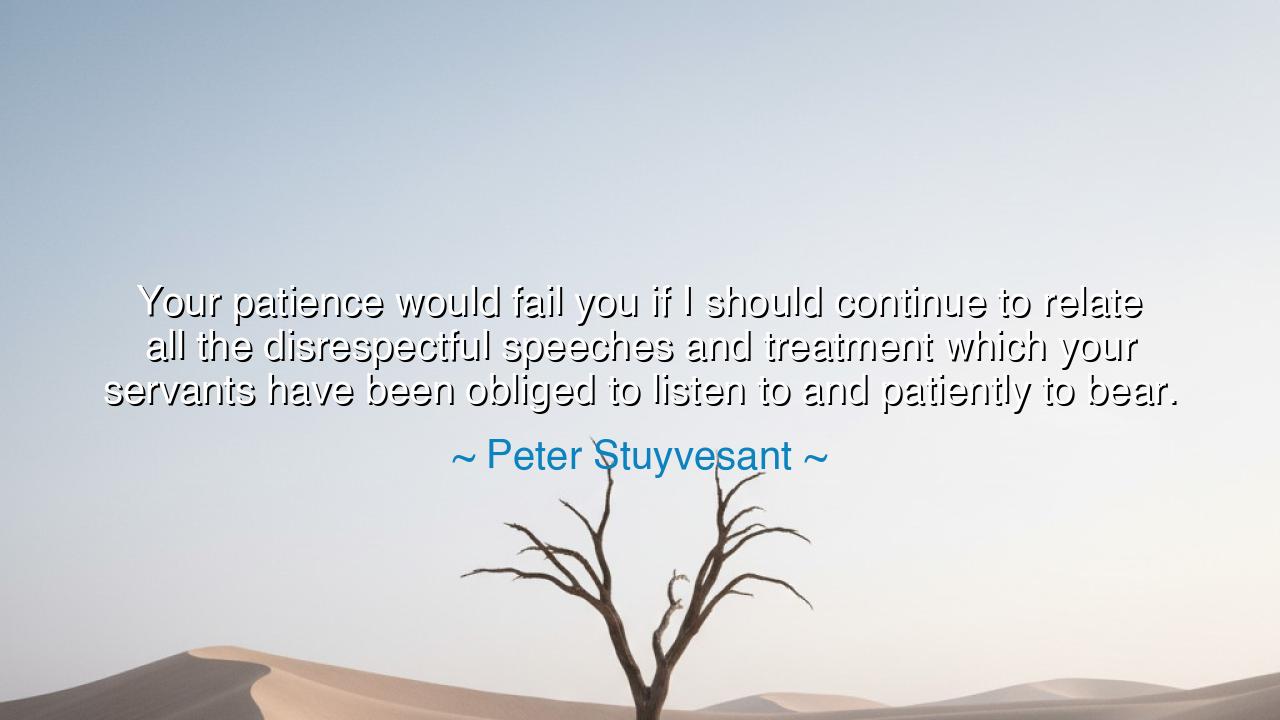
Your patience would fail you if I should continue to relate all
Your patience would fail you if I should continue to relate all the disrespectful speeches and treatment which your servants have been obliged to listen to and patiently to bear.






Hear the stern voice of Peter Stuyvesant, last Director-General of New Netherland, who wrote in frustration and weariness: “Your patience would fail you if I should continue to relate all the disrespectful speeches and treatment which your servants have been obliged to listen to and patiently to bear.” These words are the cry of a leader burdened not only by the threats of enemies without but also by the disdain of those within. They are words that echo through the ages, for every leader, every servant of duty, has faced the sting of disrespect, the endless testing of patience by those who will not yield their pride.
The origin of this saying lies in the mid-17th century, when Stuyvesant governed the Dutch colony of New Netherland—what would one day become New York. A man of iron will and rigid authority, he often clashed with colonists who resisted his governance, desiring more freedom than his stern rule allowed. In correspondence to his superiors in the Dutch West India Company, Stuyvesant lamented the ceaseless complaints, insults, and challenges he and his officials endured. His words reveal not only his own frustration but the eternal truth that those who serve often must bear disrespect in silence for the sake of peace and duty.
Consider the imagery: servants and officials enduring the sharp edge of disrespectful speeches, obliged by loyalty to remain calm, to answer not in kind but with patience. It is a picture as old as kingship itself, for rulers and emissaries alike have always carried the heavy burden of listening to reproach, insult, and rebellion. The human heart is quick to anger, but the discipline of authority requires restraint. Stuyvesant reminds us that patience is not weakness but strength—for it is far harder to bear insult without retaliation than to strike back in haste.
History abounds with such trials. Recall the story of George Washington, who as Commander-in-Chief often endured the complaints of his own officers and soldiers. They murmured about lack of supplies, cursed his decisions, and doubted his leadership. He could have silenced them with punishment, yet he bore their disrespect with a calm resolve, knowing that unity was more valuable than pride. Like Stuyvesant’s lament, Washington’s endurance shows us that the great leader’s crown is made not only of authority but of patience in the face of dishonor.
Yet there is also a deeper wisdom hidden in Stuyvesant’s grief. His words, though stern, confess the truth that even the strongest patience has limits. “Your patience would fail you,” he admits, as if to say that no man, however steadfast, can endure endless disrespect without breaking. This is a warning to all who lead and all who serve: do not mistake endurance for infinite tolerance. For just as a bow cannot remain forever bent without shattering, so too the human spirit must find relief, lest it crumble under the weight of scorn.
The lesson for us is twofold. To those who lead, it is a call to cultivate patience, for the path of authority will always be marked with insult and opposition. Respond not in anger, but with measured strength, knowing that restraint often preserves what anger would destroy. To those who follow, it is a warning to temper your words, to show respect even in disagreement, for every leader and servant is still human, and their patience, however great, can falter. Mutual honor builds peace, but constant disrespect breeds ruin.
So I say to you, children of tomorrow: learn both to endure and to restrain. If you are wronged, let your patience guard your tongue until the moment of wisdom. If you are tempted to scorn another, remember that every word may weigh heavily upon a weary soul. Stuyvesant’s lament reminds us that disrespect corrodes both giver and receiver, but patience, even when strained, is the mark of true strength. Therefore, live with discipline: respect those who serve, endure when you must, and never let anger rule your spirit. In this way, the burdens of life may be borne with dignity, and the bonds of community preserved against the storms of discord.






AAdministratorAdministrator
Welcome, honored guests. Please leave a comment, we will respond soon